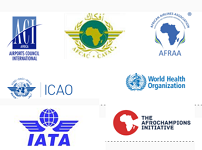African Ministers responsible for health, ICT, and transport have made a call to the African States to work towards harmonizing pre-entry and exit requirements for cross-border travel, increase mutual recognition, and cross-border information exchange.
The Africa CDC, the lead COVID-19 response organ of the African Union, has gone further to provide a platform to member states to support this undertaking known as Trusted Travel. The Ministers also called for cross-collaboration among different sectors and stakeholders.
The Call to Action comes under the umbrella of Africa Against COVID-19: “Saving Lives, Economies, and Livelihoods” campaign, which recognizes the need to define our “new normal” by striking a balance between saving lives, re-opening of economies, and revitalizing livelihoods within the African continent.
The Call to Action has been jointly developed by a multi-sector Africa High-Level Task Force, comprising of the African Union and other relevant regional and international institutions and partners. It addresses specific elements to safely re-open all borders including intra-regional and international air travel as outlined below:
i. Travel entry and exit requirements
– States should consider applying alternative measures to border closure and mandatory quarantine through instituting and strengthening the recommended non-pharmaceutical public health and social measures before, during and after travel.
– Harmonization of alternative measures to allow mutual recognition and trust in the information shared among Member States about travelers, and in particular through the use of the African Union Trusted Travel solution.
– States should consider alternative testing protocol for travel that uses the rapid diagnostic antigen test to in situations where PCR testing is not readily available or where result turnaround time is long.
– States should not impose COVID-19 vaccination certificates as a mandatory travel entry and exit requirement until there is satisfactory access to vaccines globally, reasonable vaccination coverage is attained, and sufficient evidence and guidance on the use of the vaccine for travel is available based on temporary recommendations of the 6th WHO IHR emergency committee.
However, states are encouraged to adopt modern technological tools for maximizing benefits to citizens of vaccination, especially those that align with the AU 4D principles.
ii. Maintaining safe public health corridor before, during and after travel
– States should remain vigilant to all applicable regulations, laws, guidelines and standards issued by national and international authorities aiming to minimize infection and to maintain a safe public health corridor during travel. Specifically, all State Parties should ensure that preventive measures are observed at all times.
iii. Compliance to multinational treaties and regulations
– Reminding countries to comply with the international treaties signed by State Parties that protect governments, authorities and travelers. Specifically, African Union Member States are reminded to comply with article 40 of the International Health Regulations (2005), which requires State Parties to not charge travelers for interventions meant to protect public health.
The Call to Action has been circulated to the respective Ministries and Heads of State of African States and work is underway across different levels to ensure the recommendations are carried out.
The complete Call for Action document can be accessed via the link:
About the multi-sector Africa High-Level Task Force on the Recovery of the African Air Transport Industry
The Africa High-Level Task Force on the Recovery of the African Air Transport Industry was set up to serve as an advisory body for the campaign on African against Covid-19 “Saving Lives, Economies, and Livelihoods”.
The campaign was endorsed on 20 August 2020 by the Bureau of the Assembly of the African Union (AU) Heads of State and Government with Chairpersons of Regional Economic Communities (RECS) of the African Union.

